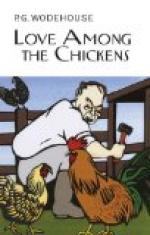We strolled out again into the garden, but somehow things seemed to drag. Conversation was fitful, except on the part of Ukridge, who continued to talk easily on all subjects, unconscious of the fact that the party was depressed and at least one of his guests rapidly becoming irritable. I watched the professor furtively as Ukridge talked on, and that ominous phrase of Mr. Chase’s concerning four-point-seven guns kept coming into my mind. If Ukridge were to tread on any of his pet corns, as he might at any minute, there would be an explosion. The snatching of the dinner from his very mouth, as it were, and the substitution of a bread-and-cheese and sardines menu had brought him to the frame of mind when men turn and rend their nearest and dearest.
The sight of the table, when at length we filed into the dining room, sent a chill through me. It was a meal for the very young or the very hungry. The uncompromising coldness and solidity of the viands was enough to appall a man conscious that his digestion needed humouring. A huge cheese faced us in almost a swashbuckling way. I do not know how else to describe it. It wore a blatant, rakish, nemo-me-impune-lacessit air, and I noticed that the professor shivered slightly as he saw it. Sardines, looking more oily and uninviting than anything I had ever seen, appeared in their native tin beyond the loaf of bread. There was a ham, in its third quarter, and a chicken which had suffered heavily during a previous visit to the table. Finally, a black bottle of whisky stood grimly beside Ukridge’s plate. The professor looked the sort of man who drank claret of a special year, or nothing.
We got through the meal somehow, and did our best to delude ourselves into the idea that it was all great fun; but it was a shallow pretence. The professor was very silent by the time we had finished. Ukridge had been terrible. The professor had forced himself to be genial. He had tried to talk. He had told stories. And when he began one—his stories would have been the better for a little more briskness and condensation—Ukridge almost invariably interrupted him, before he had got half way through, without a word of apology, and started on some anecdote of his own. He furthermore disagreed with nearly every opinion the professor expressed. It is true that he did it all in such a perfectly friendly way, and was obviously so innocent of any intention of giving offence, that another man—or the same man at a better meal—might have overlooked the matter. But the professor, robbed of his good dinner, was at the stage when he had to attack somebody. Every moment I had been expecting the storm to burst.
It burst after dinner.
We were strolling in the garden, when some demon urged Ukridge, apropos of the professor’s mention of Dublin, to start upon the Irish question. I had been expecting it momentarily, but my heart seemed to stand still when it actually arrived.




